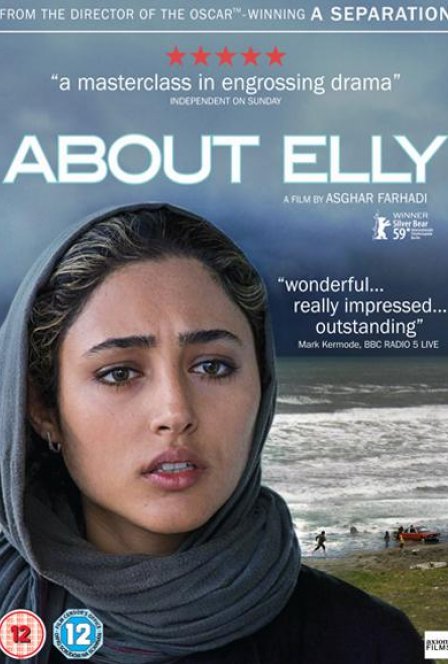With his last two masterful features, A Separation and last year’s overlooked The Past, Asghar Farhadi has put himself at the forefront of Iranian cinema. While his films differ quite drastically from the self-reflexive cinematic treatises of his fellow countrymen Abbas Kiarostami, Jafar Pahahi and Mohsen, and Samira Makhmalbaf, his skillful, complex storytelling and subtle eye for the intricate shades of human drama have garnered him much-deserved praise on the international stage. With the universal success of his latest films, his earlier work, particularly 2006’s Fireworks Wednesday and 2009’s About Elly, is now accessible in the West, the latter now even playing in limited theatrical release and, despite the lack of polish, it’s every bit as good as his subsequent films.
About Elly opens with a group of thirtysomethings (three couples, a few kids, the recently divorced Ahmad, who has recently returned from living abroad in Germany, and the titular Elly, who is somewhat discreetly being set up with Ahmad by her kindergarten student’s mother, Sepideh) from Tehran arriving at a seaside home for a long weekend vacation. Farhadi’s pacing and tone in this opening act is much like its setting — breezy and joyful, leisurely setting up the group dynamic and organically introduce each character. It plays like an Altman film, never tipping its hand as to when the plot, any plot really, will kick into gear. It’s a ostensibly innocuous opening that seems to do little more than build a believable world which these characters inhabit, yet little white lies, snide comments and snickers about Ahmad and Elly’s flirtation throughout the first night, and other innocuous remarks that seem harmless at the time are integral to the much darker and unsettling drama that follows.
By the following morning, Elly feels a sense of unease within the group and reminds Sepideh that she must return to Tehran to look after her ill mother, who doesn’t know she left town and would be worried about her. Sepideh admits to have hidden her cell phone and bag so that she can’t leave yet even by train or bus to which Elly protests to such an extreme degree, it’s clear there’s a subtext that we have not been made aware of yet. Soon after this confrontation, Sepideh leaves to run an errand and Elly is left to watch the three children by the water. We see Elly helping to fly one of the kid’s kites, running and smiling in almost transcendent glee and then a smash cut reveals one of the other children calling her parents saying another child is drowning. As the adults rush to successfully save the child, they begin to wonder what happened to Elly. None of the children saw her go into the water and when the police show up following a failed search for her body in the water, the group realize they know very little about Elly, even her actual first name.
The abruptness and mysteriousness of Elly’s disappearance is reminiscent of Anna’s from Michelangelo Antonioni’s classic seaside existential crisis drama, L’Avventura, but whereas that character shifts to the film’s background once she’s gone in favor of concerns of Eros and modern disconnection, Elly remains crucial to the central mystery here. Sepideh begins to divulge crucial information to the rest of the group about Elly which (apologies for the vagueness as I attempt to remain somewhat spoiler-free of a final act that is best experienced as such) brings gender and sexual politics in Iran to the foreground, while also remaining a deft examination of trust, guilt, friendship and the far-reaching implications that even the smallest of lies can have on a more universal level. As with all his films, Farhadi patiently reveals one layer after another creating a rich palette of swirling emotions and interpersonal drama that is handled with his typically subtle, evenhanded style.
The mystery of About Elly ultimately moves past Elly’s disappearance and who she was and onto the moral underpinnings of the various ways the characters react to the ambiguity of the situation and the social breaches that were made. The social norms it dissects are not of the blatantly misogynistic variety, but rather those deeply ingrained in even the most liberal, secular portions of Iranian society, and certainly in our own Western values as well, that casually keep a stranglehold on the archaic and conservative traditions that even those who oppose them are subconsciously following them. But rather than making these moral dilemmas the showcase of the film, Farhadi buries them deep within the subtext and allows them to surface naturally as the film progresses. As a master dramatist, he has one again reminded us of the power of the script to create a nuanced, complex cinematic world and although his visual acumen comes into own with his next film, About Elly stands as another strong example of one of the world’s true emerging talents.

